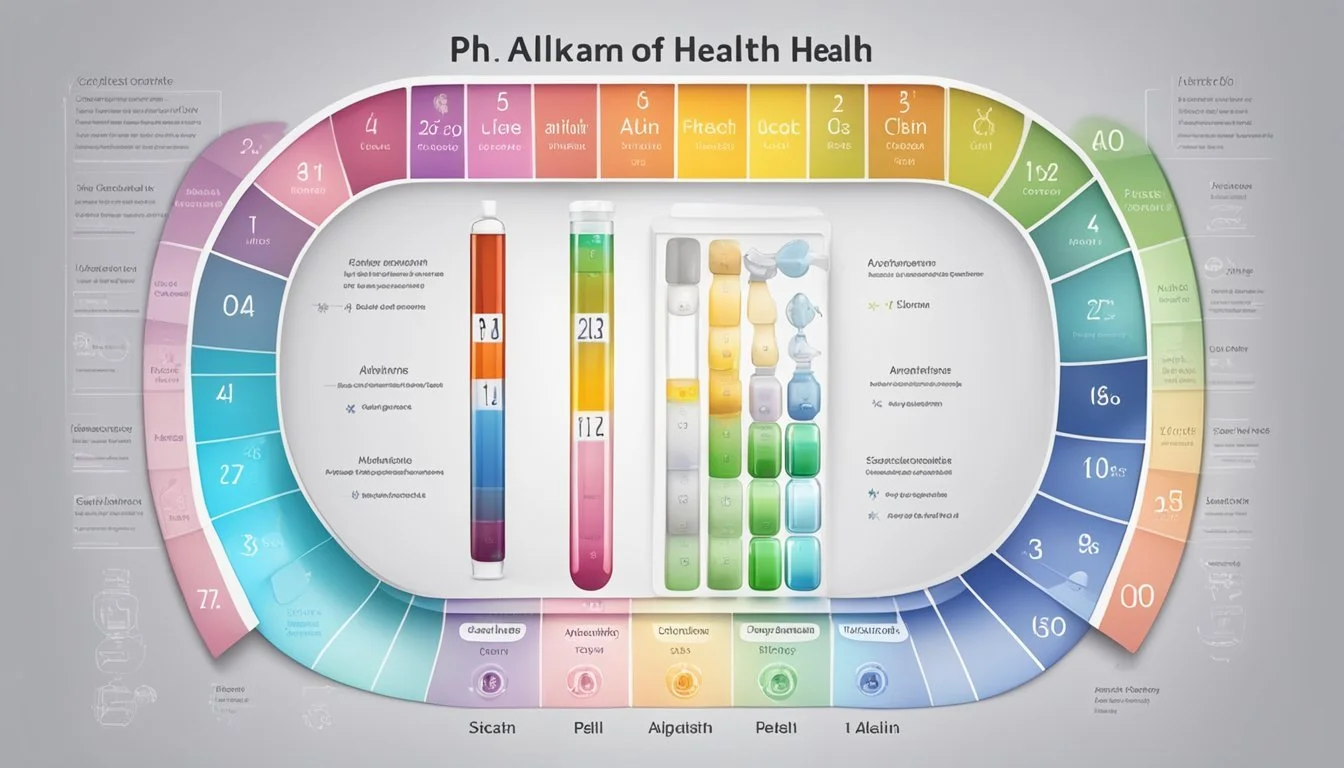Carnivore Diet vs. The Alkaline Diet
Analyzing pH Balance and Its Impact on Well-being
The Carnivore Diet and the Alkaline Diet sit on opposite ends of the dietary spectrum, each with their specific guidelines and health claims. The Carnivore Diet is an animal-based eating plan that encourages consumption of meat and animal products while eliminating plant-based foods. It is predicated on the belief that ancestral eating patterns, primarily focused on animal foods, contribute to modern health and wellness. In contrast, the Alkaline Diet emphasizes the importance of maintaining a basic pH level in the body by consuming foods that are thought to have an alkalizing effect. This diet consists mainly of fruits, vegetables, nuts, and legumes, while reducing the intake of acidic foods like meat and processed grains.
Both diets propose physiological benefits influenced by the body's pH levels, a measure of acidity or alkalinity. Human blood is tightly regulated at a pH of around 7.4, and deviations from this range can be detrimental to health. Proponents of the Alkaline Diet assert that a diet high in alkaline foods can help to balance the body's pH level and prevent various diseases. Meanwhile, those who follow the Carnivore Diet often claim that the consumption of plant-based foods is unnecessary, and that animal products provide all the essential nutrients required for optimal health.
Analyses of these diets often center around how they affect the body's pH and whether they can deliver on their health outcome promises. While the body has robust mechanisms to maintain its pH within a narrow range, dietary choices may still have an impact on overall well-being. Although both diets have their supporters, they also face skepticism and criticism from parts of the medical and scientific communities, leading to a complex discussion about nutrition, health outcomes, and the body's ability to regulate its internal environment.
Understanding pH Levels in the Body
The regulation of pH levels in the body is vital for maintaining homeostasis and overall health, influencing both metabolic functions and chronic disease risk.
The Concept of pH and Its Role in Health
pH, a measure of acidity or alkalinity, plays a crucial role in the human body, ranging from the blood's tightly controlled pH to the more variable pH of urine. A neutral pH is 7, with lower values being acidic and higher ones alkaline. The body's optimal blood pH hovers around 7.4, slightly alkaline, which is necessary for critical functions such as oxygen transport and electricity conduction in neurons.
Blood pH
Blood pH must be maintained within a narrow range of 7.35 to 7.45. Deviating from this range can result in conditions like metabolic acidosis, where excessive acid buildup or bicarbonate loss leads to a drop in pH. The buffering system involving bicarbonate (HCO3-) and carbonic acid (H2CO3) helps the body neutralize these pH fluctuations.
Urine pH and Metabolic Processes
Urine pH varies more widely, from 4.6 to 8.0, reflecting the body's need to excrete excess acid or base. This variability is part of the metabolic processes to balance pH. For example, in metabolic acidosis, the kidneys increase excretion of hydrogen ions and retain bicarbonate, aiding the restoration of blood pH levels. The urine pH can indicate the body's overall metabolic state but not the blood pH directly.
Overview of the Carnivore Diet
The Carnivore Diet centers around the consumption of animal products as its staple, emphasizing meat, fish, and animal proteins. This diet excludes plant-based foods with the belief that a high-protein, low-carbohydrate regimen leads to various health outcomes.
Primary Components: Meat, Fish, and Animal Proteins
At the core of the Carnivore Diet lies a variety of animal products:
Meat: Predominantly from sources such as beef, pork, and lamb.
Poultry: Including chicken, turkey, and duck.
Fish: Fatty fish like salmon and mackerel are common for their omega-3 fatty acids.
Eggs: Often included for their high-quality protein content.
Animal Proteins: The diet focuses on muscle meats, along with organ meats for nutrient density.
The mode of preparation often involves grilling, roasting, or searing to maintain protein integrity while potentially adding minimally to the fat content.
Potential Health Impacts of a Meat-Heavy Diet
The Carnivore Diet's high reliance on meat and animal proteins can have several health implications:
Saturated Fat: A diet heavy in red meat typically raises concerns about saturated fat, which could influence cholesterol levels.
Protein: While advantageous for muscle repair and satiety, excessive protein intake may stress the kidneys.
Vitamins and Minerals: Animal foods can be rich in nutrients like B12 and iron but lack other essential vitamins found in plants.
Research into the long-term effects of a meat-focused diet on overall health is continually evolving, with current findings varying in their conclusions.
Overview of the Alkaline Diet
The Alkaline Diet centers on altering the body's pH balance through a diet rich in certain types of foods. It operates on the principle that foods impact the pH level—a measure of acidity or alkalinity—in the body's systems.
Key Foods: Fruits, Vegetables, Nuts, and Seeds
Fruits: Emphasis is placed on incorporating a variety of fresh fruits such as apples, bananas, berries, and melons.
Vegetables: Leafy greens like spinach and kale, along with other vegetables including broccoli and cucumbers, are considered essential.
Nuts and Seeds: Almonds, chia seeds, and flaxseeds are examples of alkaline-promoting items to be included in meals and snacks.
The inclusion of these foods is predicated on their nutrient density and lower acidity compared to other food groups.
Proposed Benefits: Preventing Acidosis and Promoting Health
The Alkaline Diet suggests that by minimizing acid-forming foods and increasing intake of alkaline foods, one can reduce the risk of acidosis—a condition characterized by excessive acidity in the bloodstream. Adherents believe this shift in dietary focus contributes to improved overall health.
Comparing Nutritional Values
The carnivore diet and the alkaline diet represent two vastly different approaches to nutrition, each with unique implications for macronutrient and micronutrient intake.
Macronutrients: Proteins, Fats, and Carbohydrates
Proteins: The carnivore diet is rich in protein from sources such as meat, dairy, and eggs, providing all essential amino acids. Conversely, the alkaline diet includes plant-based proteins like legumes and nuts, which may require combining different foods to ensure all amino acids are consumed.
Fats: Animal-based foods in the carnivore diet offer high levels of saturated fats, while the alkaline diet focuses on healthier fats from sources like nuts and seeds, which provide unsaturated fats that can benefit heart health.
Carbohydrates: The carnivore diet minimizes carbohydrate intake as it excludes plant foods. In contrast, the alkaline diet embraces high-carbohydrate foods such as fruits and vegetables, as well as fiber-rich whole foods like oats and quinoa, supporting digestive health.
Micronutrients: Vitamins, Minerals, and Phytonutrients
Vitamins and Minerals: The alkaline diet is typically high in vitamin C, potassium, and magnesium due to the inclusion of fruits and vegetables. Dairy products in the carnivore diet contribute to calcium intake. Both diets should consider iron sources, with meats providing heme iron and plant foods offering non-heme iron, which is less readily absorbed.
Phytonutrients: Exclusive to plant-based foods, phytonutrients are absent in the carnivore diet, which may impact antioxidant intake. The alkaline diet, by including a variety of vegetables and whole foods, ensures a more diverse intake of these beneficial compounds.
The intake of nutrients in both diets can be considered adequate if carefully planned, but they require different approaches to balance nutritional needs.
Health Outcomes and Disease Prevention
This section examines the effects of the Carnivore and Alkaline diets on various health outcomes and their potential roles in disease prevention.
Impact on Chronic Conditions Like Cancer and Diabetes
The Carnivore Diet, which consists mainly of animal products, lacks certain phytonutrients found in plants that are thought to play a role in reducing the risk of chronic diseases such as cancer and diabetes. Conversely, an Alkaline Diet that includes a variety of alkaline foods may contribute to a lower risk for these conditions due to its higher content of fruits, vegetables, and nuts; however, scientific evidence is limited and more research is needed to substantiate these claims.
Bone Health: Osteoporosis and Fractures
An Alkaline Diet may benefit bone health due to its emphasis on fruit and vegetable intake, which offers essential minerals that may help in reducing the risk of osteoporosis and fractures. In contrast, high protein intake from the Carnivore Diet might result in increased acid load, potentially leading to calcium being leached from the bones, although this relationship remains contentious among researchers.
Kidney Health: Kidney Stones and Kidney Disease
Acid-forming foods, predominantly found in animal protein-heavy diets like the Carnivore Diet, may increase the risk of kidney stones and kidney disease by raising acid levels in the urine and blood. Alkaline diets might lower this risk by promoting a more balanced pH level; however, more empirical data is required for a conclusive statement.
Cardiovascular Health: Blood Pressure and Hypertension
Diets high in saturated fats, often associated with the Carnivore Diet, could potentially contribute to higher blood pressure and an increased risk of hypertension and heart disease. Alternatively, Alkaline diets, through their inclusion of potassium-rich fruits and vegetables, may have a favorable effect on blood pressure regulation.
Weight Management and Muscle Mass
For weight management, both the Carnivore and Alkaline diets can be conducive to weight loss if they create a calorie deficit. The abundant supply of animal protein in the Carnivore Diet supports the maintenance and growth of muscle mass. However, it is crucial to consider that long-term adherence to such a restrictive diet may have broader health implications.
Role of Diet in pH Balance and Metabolism
Regulating pH levels is crucial for optimal bodily function, and diet plays a significant role in maintaining this balance. The following subsections provide insight into how different diets impact pH levels, the body's waste elimination processes, and how exercise contributes to pH stability.
The Acid-Alkaline Hypothesis of Diet
The Acid-Alkaline Hypothesis suggests that certain foods can affect the acidity or alkalinity of the body. Foods high in minerals such as calcium, magnesium, and potassium can produce alkaline ash, which could hypothetically influence the body's pH levels. Conversely, a diet high in meat, processed foods, and refined sugar is believed to produce acid ash, increasing the Potential Renal Acid Load (PRAL) and potentially impacting pH balance. However, the human body maintains serum pH levels within a tight range, typically around 7.4, regardless of diet, due to efficient regulatory systems.
Effect of Diet on Urine pH and Metabolic Waste Elimination
Diet can influence urine pH, a measure of how acidic or alkaline urine is, which reflects how the body eliminates metabolic waste. An alkaline diet, rich in fruits and vegetables, typically results in higher urine pH, suggesting enhanced elimination of acid. On the other hand, diets with higher animal protein content, such as the carnivore diet, may lower urine pH due to higher renal acid load, indicating increased excretion of acid to maintain the body's pH balance.
The Role of Exercise in Maintaining pH Balance
Physical activity is a critical component in overall health, impacting pH balance through the production of lactic acid during intense exercise, leading to temporary acidosis. Adequate hydration, including the consumption of alkaline water for some, may help counteract exercise-induced acidosis by aiding in the clearance of metabolic waste. While the carnivore diet may induce a higher acid load, proponents argue that it can combat acidosis through various mechanisms, including altering the timing and frequency of meals to improve metabolic flexibility.
Dietary Concerns and Considerations
When considering either the carnivore diet or the alkaline diet, individuals must be attentive to nutritional adequacy and the potential for misconceptions around dietary health. Each diet comes with unique considerations that demand a detailed assessment of one's dietary needs.
Managing Proper Nutrient Intake
The carnivore diet, consisting exclusively of animal products, inherently lacks certain vitamins and minerals typically found in plants. For instance:
Grains and legumes: These are excluded but are known sources of fiber, B vitamins, and minerals.
Dairy: While included, it may be insufficient to provide the full variety of nutrients found in a more varied diet.
On the other hand, the alkaline diet emphasizes fruits and vegetables while minimizing meat consumption. Followers must consider:
Protein sources: Ensuring adequate intake from non-meat sources like legumes.
Calcium and Vitamin D: Typically found in dairy, which the diet limits, so alternative sources must be identified.
The Importance of a Balanced Diet
A balanced diet, one that includes a variety of foods, is central to maintaining health. Here's a breakdown:
Carnivore diet: High in protein and fat but usually devoid of carbohydrates.
Alkaline diet: Rich in fruits and vegetables, potentially leading to lower intake of essential fatty acids and complete proteins found in animal products.
Both diets could lead to nutrient gaps, thus the importance of a balanced approach addressing all macronutrients and micronutrients cannot be overstated.
Navigating Diet Myths and Facts with Healthcare Providers
Myths surrounding both diets are prevalent and can be dispelled only through consultation with healthcare providers. They help distinguish evidence-based dietary advice from misinformation. For example:
Registered dietitians can provide tailored plans ensuring all nutrient needs are met despite dietary restrictions.
Healthcare providers assess individual health circumstances to determine if these diets support or undermine health goals.
In summary, considering these diets demands vigilance to ensure nutrient needs are met and that the approach aligns with health objectives as affirmed by healthcare professionals.
Lifestyle and Long-Term Health
Both the carnivore and the alkaline diets focus on specific food types and their impact on the body's pH levels, but considering how they integrate into lifestyle choices and their effects on long-term health is crucial. These diets alter daily habits in different ways, influencing whole food consumption, physical activity, inflammation, insulin resistance, and mental health.
Incorporating Whole Foods and Physical Activity
The sustainability of a diet often depends on its flexibility to include a variety of whole foods and its compatibility with regular exercise. The alkaline diet encourages the consumption of a broad spectrum of fruits, vegetables, and grains, potentially supporting a balanced lifestyle. In contrast, a carnivore diet is more restrictive but emphasizes nutrient-dense animal products. Adhering strictly to either diet could pose challenges in combining exercise and a balanced food intake to maintain health and prevent high blood pressure.
Mitigating Inflammation and Insulin Resistance
Inflammation and insulin resistance are key factors in many chronic diseases. Diets high in anti-inflammatory foods, like the ones recommended by the alkaline diet, might help mitigate inflammation. However, without substantial evidence, claiming it positively affects bone mineral content or the formation of kidney stones is speculative. On the carnivore side, anecdotal reports suggest it may support weight loss and reduce inflammation, potentially improving insulin sensitivity. Still, long-term success and effects on health remain to be clinically substantiated.
The Psychological Aspect of Dietary Choices
One's food choices impact their mental health and long-term dietary adherence. Substantial lifestyle changes that accompany restrictive diets can be mentally taxing and difficult to maintain. Potential social isolation and the psychological impact of very restricted diets, like the carnivore diet, could hinder someone's willingness to continue such a regimen. Conversely, the alkaline diet's variety could be more psychologically gratifying and thus, easier to integrate into a typical lifestyle.
Future Research and Perspectives
Within the evolving landscape of nutritional science, the comparative impacts of diets like the Carnivore and Alkaline diets on pH levels and health outcomes remain promising territories for inquiry. This section provides an overview of current gaps in research and potential directions for future study.
Ongoing Studies and Evolving Dietary Guidelines
Ongoing research is instrumental in shaping dietary guidelines that reflect the newest understandings of how diets impact health. Studies focusing on the Carnivore diet, which is low-carb and mimics ketogenic metabolic states, are assessing long-term health outcomes, considering its growth in popularity despite the diet's limited plant intake. In contrast, research into the effects of Alkaline diets on the body's pH and the proposed health benefits continues to develop. These diets are hypothesized to influence acid-base homeostasis and have implications for energy regulation and disease prevention.
Future developments may adjust current dietary recommendations as new evidence emerges.
Research comparing the health outcomes of each diet’s influence on systemic pH and the subsequent physiological responses is needed.
Investigators in this field are scrutinizing both dietary patterns to clarify their roles in metabolic health, cancer risk, and chronic disease management.
Personalization in Nutrition and Diet
The momentum toward personalized nutrition underscores the importance of tailoring diets to individual biological profiles. Future studies are poised to delve into the complexity of how the Carnivore and Alkaline diets affect different individuals, which could lead to more nuanced dietary advice.
Researchers are examining genetic markers that might predict better adherence or response to these diets.
Studies are investigating how individual differences in metabolism could dictate the efficacy of low-carb and ketogenic diets like the Carnivore diet.
Personalization in nutrition aims to optimize health outcomes by considering the unique physiological and genetic makeup of each individual. This approach may reveal why some individuals thrive on specific diets while others do not, leading to a new era in dietary design and intervention.






